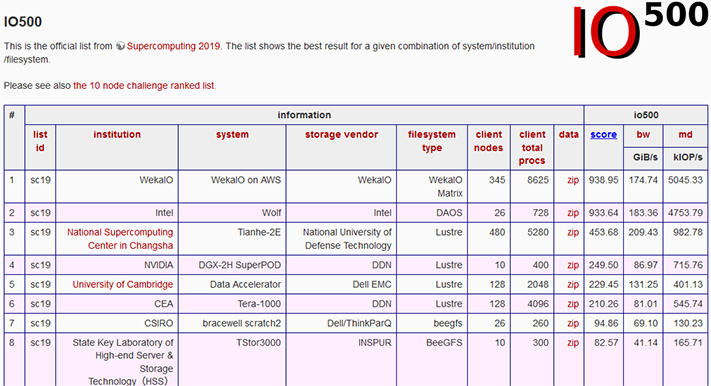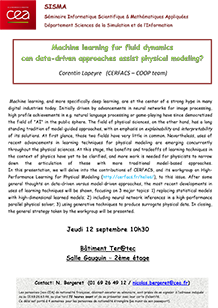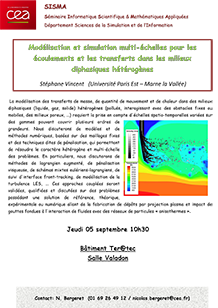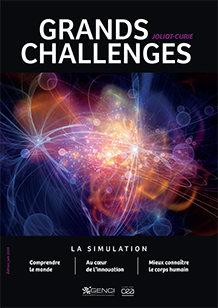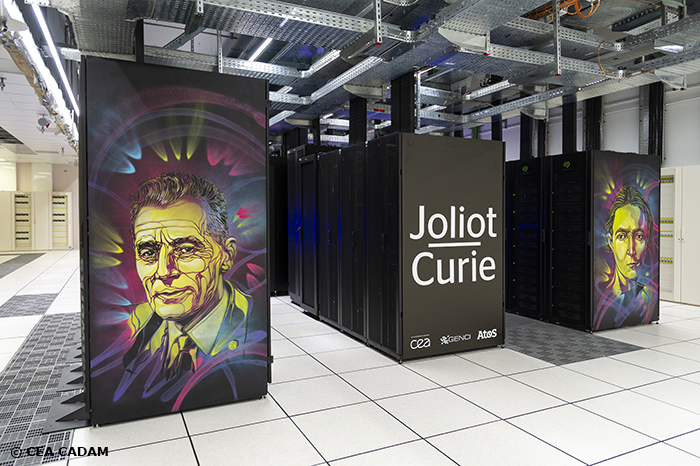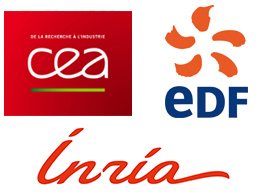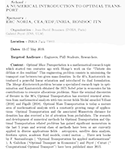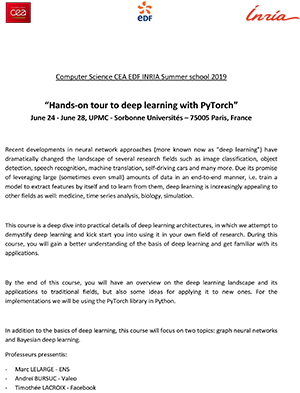NEWS
2019

Supercomputing 2019
Numerical simulation, massive data processing and AI enabled and boosted by HPC have become an indispensable tool for technology and research progress.
As a European HPC leader, this was the opportunity for CEA to showcase its experience and involvement in HPC, Big Data and AI from technological research and development to applications, and to highlight the pivotal role of its supercomputing facilities.


A delegation of Masters students from University of Reims Champagne Ardennes (funded by URCA Foundation) visit our SC19 booth, meeting CEA experts and learning more about HPC.

CEA HPC experts on our booth
HPCwire Editor’s Choice award in the area of Best Use of HPC in Life Sciences granted to a CEA team
A research team led by Dr. Luc Bergé (Research Director at CEA) got his award. CAPITOL project used compute hours allocated by PRACE (24.1 million hours on CURIE machine hosted and operated at CEA TGCC, made available by GENCi). The objective was to explore new physical mechanisms for the conversion of ultra-intense laser light into various photon and particle sources, from THz to X-rays, via laser-plasma interactions. Several massively parallel numerical codes were used for this purpose. The study could lead to a breakthrough in high-resolution medical imaging for breast and skin cancer tumors detection.


PRACE GENCI et CEA reçoivent le prix
TERA 1000 ranks Nr 6 in the latest I0500
CEA ranks number 6 in the November 2019 IO500 list of the most efficient storage systems, with its flash parallel file system on TERA 1000-2 supercomputer.
Informatique Scientifique & Mathématiques Appliquées
Machine learning for fluid dynamics can data-driven approaches assist physical modeling?
Corentin Lapeyre (CERFACS – COOP team)
Campus Ter@tec.
Read moreInformatique Scientifique & Mathématiques Appliquées
Modélisation et simulation multi-échelles pour les écoulements et les transferts dans les milieux diphasiques hétérogènes
Stéphane Vincent (Université Paris Est – Marne la Vallée)
Campus Ter@tec.

Seminar INHP@CT:
Driven Development philosophy and 9 years usage feedback for research in HPC
Sébastien VALAT, Engineer at ATOS/BULL.
Summary
"Nowadays HPC systems still continue growing and offer capabilities to handle more and more complex simulations. It goes with a large increase in complexity to be managed by the engineers and researchers who develop the software stack. Test Driven Development (TDD) is a well-known technic in many fields now, more on the Java, python and web world. On the HPC side, this is not so often used or known for many reasons: legacy codes/languages, research developments, not trained developers.... "
The diversity and interest in using compute-intensive computing to support numerical simulation modeling has once again been highlighted by the exceptional results presented in this issue, sometimes even the "world firsts", obtained by these pioneers of calculation.

Seminar INHP@CT:
Retour d'expérience : gestion de configuration et intégration continue.
Olivier DELHOMME and Thomas MEJEAN, System Administrators at CEA DRF in Evry, presented their work «Feedback: configuration management and continuous integration.
Summary
"We will present how we manage server configuration and how we can instantiate applications for puppet users using concrete examples.
Finally, we will see how we empower users through the integration and continuous deployment with gitlab and rundeck associated with the openstack infrastructure. "
14th TERATEC Forum
The TERATEC Forum is a major event in France and Europe that brings together the best international experts in HPC, Simulation and Big Data. It reaffirms the strategic importance of these technologies for developing industrial competitiveness and innovation capacity.
As part of its activities related to HPC, the CEA DAM Île-de-France is naturally represented as every year.
Inauguration of Joliot-Curie, the French supercomputer dedicated to French and European research
At 9.4 petaflops, Joliot-Curie is France’s third supercomputer and is set to become the most powerful French research supercomputer in 2020 when it reaches 22 petaflops. Designed by the European leader in supercomputing, Atos, for the French national high-performance computing organisation (GENCI), this new supercomputer located at the CEA’s Very Large Computing Centre (TGCC) was inaugurated on 3 June 2019 by François Jacq, CEA Chairman, Thierry Breton, Atos CEO, and Philippe Lavocat, GENCI CEO.
Summer Schools CEA-EDF-INRIA 2019
Summer schools are intended for researchers, engineers and PhD students. They allow them to review the state of progress of the proposed subjects and to confront their experience. The teaching is done in English. It is complemented by practical works, hosted by assistants.
A NUMERICAL INTRODUCTION TO OPTIMAL TRANSPORT
HANDS-ON TOUR TO DEEP LEARNING WITH PYTORCH
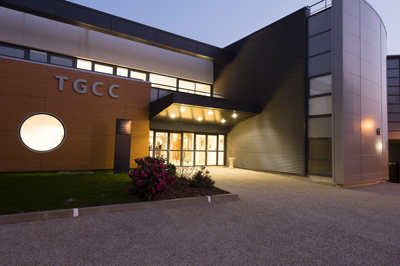
Better understanding of the climate system through digital simulation
News release
French scientists offer strong contribution to coordinated international effort to better understand the climate system through computer simulations.
Climate scientists at the Institut Pierre Simon Laplace (IPSL) and CNRM-CERFACS announce today the release of new datasets that promise to provide fresh insights into past and future climate change. IPSL and CNRM-CERFACS are engaged, with other climate research centres, in an international effort to provide a new generation of climate change experiments.

Seminar INHP@CT:
Programming for In-Memory Computing
Maha Kooli, researcher at the Laboratory of Computer Science, Robotics and Microelectronics of Montpellier, will present his work on PProgramming In-Memory.
Summary
In-Memory Computing (IMC) corresponds to a new data computation concept that brings the computing operations inside the memory units. It has been introduced to overcome the von Neumann bottleneck in terms of data transfer rate and power consumption.
A new IMC system based on SRAM architecture is introduced. It permits performing logic operations (and, or, xor, etc), arithmetic operations (addition, subtraction, etc), and memory operations (set, reset, write, etc). IMC system permits highly parallel computation inside the memory.
At the current research stage, the circuit-level design of the IMC system has not been completed yet. We therefore introduce a dedicated software platform based on LLVM that includes emulation tools to early experiment and evaluate how applications can take advantage of the IMC system. We evaluate the execution time and the energy consumption and we compare to conventional CPU-based systems. We target different application scenarios in various fields (image processing, cryptography, intensive computation).
Salle Valadon, Campus Ter@tec, 11h – 45 min.

